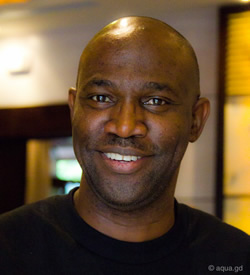

Follow these links to find out more about the Health Policy Project's related work.
- Learn about HPP's work involving Key Populations
- Read about HPP's activities in the Caribbean Region
Organization: Caribbean Vulnerable Communities Coalition (CVC)
Country: Jamaica
Area of Response to HIV: Key Populations
Interview was originally published in the April 2014 newsletter.
Interview with Ivan Cruichshank
Ivan Cruickshank is the policy and advocacy coordinator for the Caribbean Vulnerable Communities (CVC) coalition, based in Kingston, Jamaica. He has worked on HIV-related issues since 1991, and taught public policy at the University of the West Indies before joining CVC in 2009. The HIV Policy and Advocacy Monitor recently spoke with Cruickshank about the HIV policy environment in the Caribbean region and CVC's work and achievements.
CVC is a coalition of community leaders and organizations in Jamaica that provide services to and advocate for populations that are especially vulnerable to HIV or may face barriers to accessing health and social services. CVC works to promote leadership among stakeholders and raise the general population's awareness about HIV prevention.
HIV Policy and Advocacy Monitor: What led you to work in policy and advocacy?
I started out as an activist in 1991, with the launch of Jamaica AIDS Support for Life, the oldest and largest human rights organization dedicated to the response to HIV/AIDS in Kingston, Jamaica. At first we weren't focused fully on advocacy, but just trying to address the epidemic by sharing information, rallying resources for people who were dying, and creating a space for the Lesbian, Gay, Bisexual and Transgender (LGBT) community to interact and take action regarding HIV. This evolved into active advocacy as we saw unmet needs and generally poor responses to the issues of the LGBT community, especially among health service providers.
HIV Policy and Advocacy Monitor: Why are policy and advocacy important for meeting the needs of vulnerable communities in the Caribbean? What role does policy and advocacy plan in meeting the needs of vulnerable communities in the Caribbean?
Most of the work that we do involves appreciation and understanding of the policy context and policy actors. We are often trying to implement programs and activities without a full appreciation of what will give us the desired result. Understanding and appreciating the role that a policy plays in creating an enabling environment will give us the required foundation to help the people we are trying to help. It is critical to ensure that the key populations we are trying to represent have a voice in the policy process, policy development, and policy implementation.
HIV Policy and Advocacy Monitor: What policies has CVC been working to address lately? Can you discuss some of CVC's current policy work?
We've been analyzing and addressing gender policies, sex work and reproductive health policies, policies that affect key population groups, workplace policies, and partnership and collaboration around the Occupational Health and Safety Act. This policy is now at the stage where it is being made into legislation. CVC and its member organizations have been working with employers to build their understanding of key population groups and HIV.
HIV Policy and Advocacy Monitor: What is a recent policy or advocacy success CVC has achieved?
We had a change in leadership in the Ministry of Health (MOH) of Jamaica, and there were concerns regarding the issue of stockouts of antiretroviral drugs (ARVs.) In 2012, a consortium of Global Fund Country Coordinating Mechanism representatives, led by CVC, recognized that access to ARVs is likely to be a further challenge, given the impending withdrawal of Global Fund funding from Jamaica. We organized meetings between MOH representatives and key civil society partners, wrote letters to the minister, and even held a demonstration in front of the MOH to highlight the concerns of civil society about stockouts that could arise if funds were not identified to support ARV provision. The minister was receptive and engaged the National AIDS Program (NAP) in discussions to develop a policy that calls for a minimum amount of ARVs to be available at a given time. These efforts led to Cabinet approval of government funding for ARVs as part of its recurrent budget. The NAP is now in the process of developing a system to monitor ARV supplies to minimize the incidence of stockouts.
HIV Policy and Advocacy Monitor: What issues do you think need greater attention in the response to HIV?
Issues around women need a lot more attention in the Caribbean region, specifically policies related to domestic violence and abuse. Additionally, there is a need to focus on policies that address sexual violence—-not just against women, but sexual violence against men as well. These issues need more attention across the region, yet there are cultural issues that prevent us from addressing this issue. The laws in Jamaica, and to a great extent the wider Caribbean, define rape and sexual violence from a heterosexist perspective, hence it is not possible that males can be raped—-a charge which carries a more extensive sentence than buggery, which is often the way male sexual exploitation is categorized.
HIV Policy and Advocacy Monitor: What is the role of civil society in ensuring the sustainability of HIV and AIDS programs for key populations in the Caribbean?
Civil society organizations (CSOs) have three fundamental roles in ensuring the sustainability of the HIV response in the region, specifically as it relates to key populations. First, CSOs must continue to engage in developing policy awareness to effectively monitor how well their government is performing relative to its commitments, whether nationally or internationally. Second, CSOs can lead initiatives that might be difficult for the government to implement, such as engaging with traditional social actors, including the church and community groups, to reduce stigma and discrimination. Third, civil society will need to reframe how resources are utilized to ensure that the best value is given and received for the limited resources available.
More information on the work of CVC can be found at: http://cvccoalition.org/